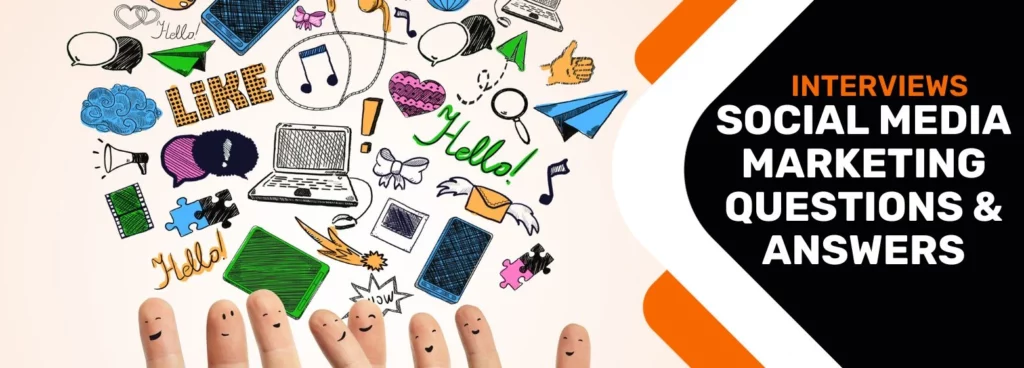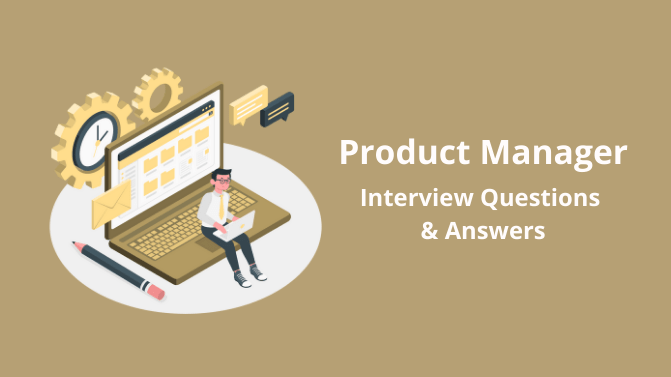Definitive Guide to Answering Interview Questions Using the STAR Method
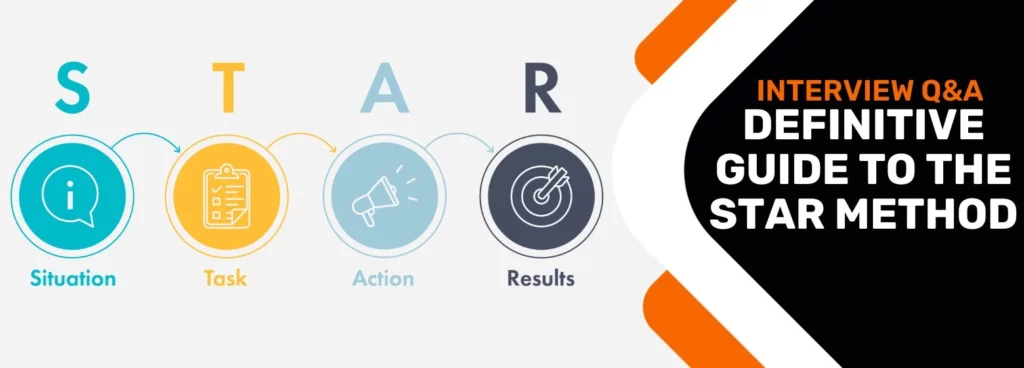
What Does STAR Stand For?
The STAR method serves as a structured approach to answering behavioral interview questions by providing a well-organised and comprehensive response.
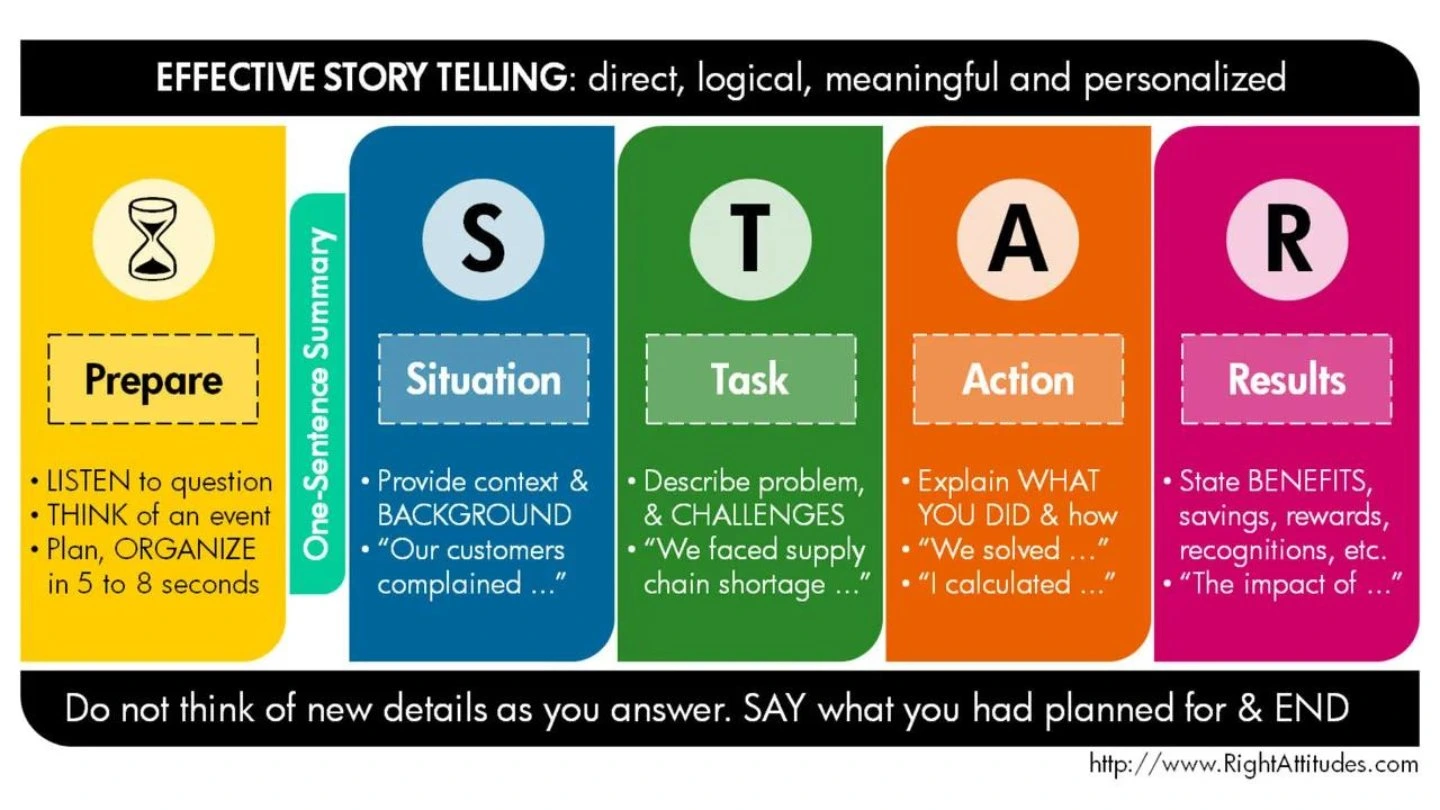
STAR stands for:
- Situation: Begin your response by describing your specific situation or context. Clearly outline the circumstances, setting, or any relevant background information. This sets the stage for the interviewer to understand the scenario you will discuss.
- Task: Explain your mission or objective in that particular situation. What was your role, responsibility, or goal? This part of the response defines what was expected of you.
- Action: Describe your efforts to address the situation and complete the task. Detail the steps you followed and your involvement. Emphasise what you did, focusing on your skills, decisions, and behaviors. Use this part to highlight your abilities and problem-solving approach.
- Result: Conclude your response by explaining the outcome or results of your actions. Discuss what happened as a direct consequence of the steps you took. Use this opportunity to quantify your achievements, highlight your impact, and mention lessons learned.
Using the STAR method helps structure your responses, making them clear, concise, and comprehensive.
It enables you to showcase your abilities and experiences effectively in a way that interviewers can easily understand and evaluate.
How to Answer STAR-Related Questions in an Interview
The STAR interview technique is structured to effectively convey your experiences and the valuable insights you've gained from them during job interviews. By adhering to each letter of STAR, you can ensure that your response is well-organised and impactful.
Here are some critical tips for using the STAR technique to answer behavioural interview questions:
- Be Concise: Keep your response within two minutes or less. Succinctness is key.
- Stay Positive: Focus on stories that showcase your growth and lessons learned rather than failures. Highlight experiences that end with significant takeaways.
- Stay Focused: Maintain relevance to the job at hand. Avoid tangents and only share information directly related to the position.
- Be Honest: Honesty is crucial in behavioral interviews since interviewers may ask follow-up questions. Fabricated experiences can lead to complications and should be avoided.
Let's create a sample STAR response. Imagine you're applying for an internship with a finance team, and the interviewer asks, "Can you tell me about your experience with Excel?" Even if you lack work experience, you can draw from school and transferable skills.
Consider a time when you used Excel for a class project and structure your response using the STAR method:
- Situation: Last year, I was enrolled in a business class where we were tasked with creating a business plan. This was part of a group project.
- Task: We were free to choose any business type for the project. As I am passionate about CrossFit, I decided to simulate the launch of a CrossFit gym. My specific task was to prepare financial statements.
- Action: To accomplish this, I conducted extensive research, focusing on start-up costs, anticipated income, and the timeframe for the business to turn a profit. I took it upon myself to handle the project's financial statements and reporting aspect, using Excel extensively. Based on the marketing plan I developed, I calculated that the gym could reach profitability in six months. It was a challenging but fulfilling experience that allowed me to become proficient in Excel.
- Results: As a result of this project, I gained a thorough understanding of Excel and earned an 'A' grade for the work. This experience was instrumental in expanding my Excel skills and understanding of financial planning.
Instead of merely stating that you've used Excel in class projects, the STAR method enables you to provide specific details about your achievements. This approach aids interviewers in visualising your potential in the role, setting you apart from other candidates.

Answering General Workplace Questions Using the STAR Method
1. Have you ever been confronted with a challenge? What solutions did you come up with?
Interviewers will ask this question to determine what you do to handle issues in your work. Think about the most recent time that you had to face the challenge and overcome it. You can also talk about the experience that helped you improve the craft you are working on and improve your skills.
Sample Answer:
It was a time when I worked on an assignment with my team. One of our group members chose to leave the group in mid-project for personal reasons (Situation).
I know that in any scenario, I must complete the project to ensure the company's reputation is in good standing (Task).
However, I contacted the other member, and we decided to split the remainder of the work equally. We did everything to finish the work until we achieved the goal (Action).
Despite the deadline being extremely tight, we completed the task on time (Result).
2. What was the last time your client demanded the impossible? How did you go about the client?
In the course of the interview process, the interviewer will ask how you handle demanding clients to get a better understanding of your customer service abilities. This question will determine whether you will be assessed based on your problem-solving abilities, interpersonal abilities, and ability to handle tension and stress.
Sample Answer:
A client requested a highly complex feature to be completed within a timeframe they believed was unrealistic (Situation).
I was required to discuss the project's difficulties and limitations and offer a more feasible approach (Task).
I made sure that I listened attentively to the client's demands and concerns. I also explained to them the technical difficulties involved and highlighted the dangers of speeding up the development process (Action).
The client was impressed by my open communication. We agreed to an accurate timeline, which was completed in line with the new deadline (Result).
3. Have you been required to correct a mistake made by your superior? What was your method of dealing with the scenario?
The interviewer wants to know what you'd do in an uncomfortable situation with your superior. Discuss your thinking process and your actions to respond to the question. Be sure to demonstrate your professionalism to potential employers.
Sample Answer:
I found a lapse in judgment by my supervisor in a software project (Situation).
I decided to take the responsibility upon myself to fix the error and to communicate the issue to my supervisor (Task).
First, I analysed the code and identified the problem in depth. Then, I analysed the issue with my superior professionally and respectfully, in which I provided evidence and suggested possibilities for solutions (Action).
My supervisor was aware of the error and appreciated my suggestions. Together, we rectified the problem and made necessary modifications to avoid repeating the same mistakes from happening again. The project was completed with better quality (Result).

4. How do you handle unexpected workplace changes?
The reason for asking this question is to learn more about managing a dynamic, constantly evolving workplace. Interviewers might be looking to see if you're confident and calm in the face of these challenges. They might be curious to know what you've done with your skills in an earlier position.
Sample Answer:
I've dealt with unexpected workplace changes several times as a software developer (Situation).
I deal with unexpected changes in my workplace by using the following strategies (Task).
In the beginning, I analyse the effect of the change and the work that needs to be accomplished. After that, I talked to my team members and asked for their input and suggestions to help me better adapt to the new requirements. I also keep my work organized by breaking my tasks into manageable parts and prioritizing them according to their importance. In addition, I am open and flexible to adapt to changing circumstances (Action).
With these tips, I’ve dealt effectively with unexpected workplace changes and ensured that my work gets accomplished efficiently and efficiently (Result).
5. Tell me about one of your most significant professional achievements
Employers can assess whether you possess the work ethic and skills they're looking for and whether your behavior aligns with their ideals. The choice of your most significant accomplishment will reveal what is essential to you.
How you were able to achieve it will reflect your style of work. You can communicate both your soft and hard capabilities when answering this question.
Tips:
You should be proud of the work you do. However, keep your achievements a secret. If asked to answer questions, give an example and explain your thinking process.
Your response to the interviewer must be logical and reflect your attitude to your success and dedication. Make sure that you appear grounded and honest.
It is suggested that you employ the STAR method for structuring your response to ensure clarity.
Sample Answer:
In my last job in the technology development department, we had to let go of one of our team members because of a move. (Situation).
His responsibility was to manage his team in the iOS creation of the application. The other team members needed to gain experience in developing apps that worked on iOS. Because I've developed iOS applications in the past, I was able to lead the development of apps. (Task).
Along with others on the team, we were responsible for designing and troubleshooting a new application. (Action).
It took me 35 days to finish the development on time. Currently, the app has more than 180 positive reviews in the iTunes Store, providing an additional revenue stream for the company. (Result).
Answering Questions on Teamwork Using the STAR Method
1. Have you ever disagreed with yourself and a colleague? What solutions came up?
In dealing with such behavioral issues when dealing with such behavioral issues, it is crucial to be cautious. Working together and being able to work through conflict can improve productivity as well as create a comfortable work setting. Therefore, you need to express your thoughts clearly about the dispute and the resolution you came to in your response. It is essential to be considerate and not smear your coworker, regardless of how difficult the situation may have been. The result should be clearly defined.
Sample Answer:
One time, a team member believed that my method of working on the task was wrong. The way he expressed his opinion was brutal to me (Situation).
The requirement to collaborate on this project was likely an uphill task, and the person needed to be familiar with the concept. When I explained an idea to them, they'd frequently interrupt me (Task).
I decided not to be angry with them and instead asked them politely for any other ideas that could be useful. They shared their ideas, and we debated the ideas as a group. They offered us some ideas, and we decided to pursue them as a group (Action).
In the end, we had better outcomes. We also worked out our differences and became friends (Result).
2. Have you ever collaborated with another department to finish a project?
Many interviewers ask these types of questions when cross-functional teamwork is essential to their work. The teamwork skills you must remember including active listening, communication, conflict management, forming consensus, empowering other team members to contribute, and so on.

Sample Answer:
At my previous company, there was a C-suite, Marketing and Operations, Creative Services, the Content and Communications department, and Consumer Insights (Situation).
We had to collaborate with them to learn business requirements better when creating the latest software solutions. Collaboration between departments was an essential aspect of our work throughout the day (Task).
We created a plan to meet weekly regularly to discuss more complex projects. We would then collaborate during the remainder of the week on the needs of our group (Action).
All in all, the set-up proved flawless and ensured the smooth running of the project through every phase (Result).
3. Do you have any suggestions to handle colleagues who are incompetent or not willing to cooperate?
Many employers inquire about your experiences with difficult colleagues to determine how well you manage these individuals. It is essential to show respect when responding to this. It is possible to be asked if you're an excellent team player who can collaborate well with other people or like any kind of interpersonal relationship. It is usual for businesses to search for candidates who can handle difficult situations and keep calm even in the midst of them.
Sample Answer:
As a customer support specialist and my coworker, I was in charge of calling clients to confirm the login details (Situation).
We were curious how the client list would be divided among us. At first, I believed I'd get in touch with clients whose names are A-K, while my colleague was hoping to reach out to clients with names L to Z. We needed to be on the same page about this, which confused us. This also led to dismay and anger for our clients since we repeatedly contacted them (Task).
When we shared our anger, we acknowledged that we were misunderstanding each other's words. In the future, for projects similar to this, I suggested an organised spreadsheet with colours that showed the people who would be working with which clients (Action).
This new method has worked well for us since the incident, and we've had no more similar issues (Result).
Answering Communication Skill Questions Using the STAR Method
1. Have you had to make unpopular choices? What were you able to do?
The drawback of being a leader or manager is making decisions that are only sometimes agreed with. It is essential to inform the interviewer that while you decided to push ahead, you were conscious of communicating with others in the company and improving their support of them.
Sample Answer:
While at my previous employer, I was tasked with supervising the work of a small group of colleagues on a massive project (Situation).
As the project was enormous and could have a significant impact on the reputation of the company, the project needed to be completed swiftly. (Task).
Due to the time constraint due to time constraints, we were not able to finish the project in the week, so we chose to work on Saturdays to complete it. We did this by ensuring rewards to my team members for their efforts. Once I revealed the news about overtime work to my colleagues, they were furious and began to develop feelings of resentment towards me. However, I assured them of the proper rewards and explained to them the reason why it was crucial to get that bargain. (Action).
My team was convinced and on board to finish the project. We also were able to attract new clients. In addition, my team was awarded for their hard work with incentives and appropriate acknowledgment. In the end, everyone was content. (Result).

2. Do you have a story to share about a time you disagreed with your boss and how you dealt with the issue?
In essence, this question is intended to assess your communication skills and the degree you possess. Interviewers will look for various aspects of your responses, including authenticity, emotional maturity, loyalty, and responsibility.
Sample Answer:
There was a dispute between myself and my supervisor about the best method to help an intern (Situation).
To avoid confronting the man in front of the world, I spoke on the floor instead. I shared my concerns regarding his conduct candidly and honestly (Task).
During this conversation, it was evident that there was an unintentional miscommunication (Action).
An argument with colleagues has taught me the importance of communicating to avoid problems that could become more serious (Result).
3. Have you ever influenced anyone to do something?
Interviewers will use this question to evaluate your ability to convince. The interviewer will ask you to provide specific examples and activities in which you successfully influenced others.
Sample Answer:
In my previous position as a software engineer, I observed the fact that one of my coworkers needed to follow the best practices in the documentation of code (Situation).
I needed to ensure uniformity in our team's documentation and code quality. Therefore, I had to convince my colleague to alter his methods (Task).
I contacted my colleague and shared my concerns over the absence of the documentation for his codes. I also emphasized the advantages of maintaining high-quality code and how it can help over the long term. To convince me, I presented best practices, gave examples, and promised assistance with any queries or issues you might have (Action).
My colleague initially hesitated to alter his method; however, after hearing my suggestions and observing the advantages, he decided to enhance the documentation within his code. The result was that the code quality improved, allowing us to work more effectively in future projects (Result).
4. Have you had experience in motivating others? What steps did it take to get there?
This test aims to find out if you can work within a team and motivate your colleagues. Being capable of influencing others around you will allow you to integrate into any group. Remember to share the results you have achieved through your enthusiasm.
Sample Answer:
In my previous job, I had a colleague on my team who was only partially dedicated to the task, thereby hindering the delivery of their products (Situation).
It took a lot of effort from me to make it a point to visit their desks each morning to be able to comprehend the struggles they were experiencing and encourage them to be more motivated (Task).
They talked with me about their issues and inability to concentrate due to insecurity. I pushed them to be more confident by emphasizing how their abilities were vital to this project. I also regularly provided feedback on their performance (Action).
As time passed, the team members began to voice their opinions and propose innovative, original ideas at meetings with the staff. They felt respected and appreciated, which increased their confidence in themselves, and in the end, it went well for our team as well (Result).
Answering Self-Management Skill Questions Using the STAR Method
1. Have you ever had a time when you were required to be strategically focused to accomplish your goal?
When asking this question, the interviewer wants to know what you do to manage prioritisation and the capacity to perform under stress. A crucial skill for managers and individual contributors alike is the capacity to prioritise effectively regardless of the inability to finish every task.

Sample Answer:
My job was a mix of several competing priority areas, and it was frequently challenging to identify the most crucial and urgent to fulfil my duties (Situation).
My supervisor and I worked to develop a scale for assessing the urgency and importance of a job to make it clear which task is the most critical priority right from the beginning (Task).
The priority was placed on significant, meaningful, and urgent (IU). The next category was important and vital but not essential (INU), then urgent and not essential (UNI), then not urgent and not important (NINU). I was approached by my boss, who was labeled with IU, INU, UNI, and NINU at the time, that it was the system for rating being used (Action).
In the wake of this prioritisation scoring system, my total efficiency has increased significantly over the last year (Result).
2. Let us know about an instance when you fell short. Did you learn anything from this failure?
If an interviewer asks you to provide specific examples from work, you should think of the details of a past event directly related to your job. It is best to select the story of a time when things did not go as planned due to your actions (or inactions) and not a less critical incident.
Sample Answer:
When I started my career as a software engineer, I was assigned to develop the new feature of a web-based application (Situation).
I was responsible for implementing the feature within a predetermined timeframe and ensuring it was compatible with the application already in use (Task).
I approached the job with enthusiasm and began coding immediately. After several days, my code wasn't functioning correctly; however, I had no way to pinpoint the root of the problem. Confronted with my error, I contacted my boss and explained my issue. He was able to help me to debug the code and pinpoint the problem (Action).
Due to the time required to test our code, we still need to meet the deadline for launching the feature. I learned that I approached the project with more discipline, planning, and testing the code before starting to create the code (Result).
3. Do you remember the first time you worked? How did you get the ropes? How did you adapt to a new workplace?
In asking the question, interviewers are interested in knowing how you interact with people with different personalities and how you inspire people to take a personal interest in the work or undertaking beyond a paycheck. They are interested in knowing how you handle job-related issues and learn from them.
Sample Answer:
My initial job experience as a developer came from a small software development firm. I was just from college and was eager to put my expertise in a professional environment (Situation).
My job was to create a new feature for an existing web application, which required me to study the standards for coding used by the company and the working processes (Task).
I spent the first few days looking around and asking questions regarding the company's coding procedures and practices to get a feel for the process. I also acquainted myself with the codebase by reading the codebase. After solid knowledge of the company's work procedures and the coding standards, I began to work for the new function. I communicated frequently with my colleagues and supervisors and solicited feedback regarding my code and ways to improve my work (Action).
With my dedication and commitment Through my hard work and dedication, I was able to finish the new feature in time and to the satisfaction of my supervisor and coworkers (Result).
Answering Critical & Creative Thinking Questions Using the STAR Method
1. What was the last time you took initiative and displayed determination to tackle an issue?
Interviewers will ask the question to see whether you're an independent thinker with a solid determination to be innovative if you put your total effort into something based on your motivation, not because of obligation.
Sample Answer:
Recently, I had to work on a task within the shortest time frame. As we neared the deadline, we noticed several unanswered requirements that still needed to be considered. (Situation).
My responsibility was to manage the situation and ensure we would make it to the deadline by addressing the missing requirements (Task).
I decided to call a meeting for the team members and other stakeholders to discuss the gaps in requirements. During the meeting, I asked questions and made notes to ensure everyone was on the team. Following the meeting, I identified the tasks that had been completed and then assigned the tasks to team members. I ensured that I provided regular updates to participants, keeping them updated about the progress made (Action).
Thanks to my proactive approach, we were able to meet the issues and meet the project deadline. The project's stakeholders were happy with our efforts and praised how we kept them updated (Result).
2. Share an instance where you used logic or data to develop recommendations
Employers typically will ask this question to ensure they can evaluate your thinking abilities and your capacity to deal with unexpected challenges. The hiring manager usually appreciates people who can use logic to determine the best approach in different circumstances. You can show your problem-solving abilities by providing specific instances of ways you can be a good fit for an organization.
Sample Answer:
In my time at my previous company, I analyzed data daily to study competitors' strategies (Situation).
The sales of our significant competitors rose by 5% during the month of high traffic, which differed significantly from our estimates at the moment (Task).
Based on the latest market research and critical previous data, we figured out that our competitor's analytics model could provide more accurate forecasts in the future (Action).
Through multiple testing of each adjustment, I increased our forecast's accuracy by 20 percent. (Result).
3. Have you ever had a goal you set and then achieved it?
In particular, the interviewer wants to determine your goals and ambitions through this query. The hiring manager is trying to determine if you can accomplish the goals that you have established for yourself. It could be beneficial to demonstrate your organisational skills to demonstrate your potential and set yourself apart from the other applicants.
Sample Answer:
As a software developer, I wanted to enhance my knowledge of a specific programming language I needed help understanding (Situation).
My goal was to establish the goal of improving my knowledge of the programming language and to accomplish that goal with dedicated training (Task).
To reach my goal, I began by establishing a specific and quantifiable goal for my progress. I then mapped out websites and exercises to help me to achieve my goals. I set aside a specific amount of daily time to practice my programming language. I also kept track of my progress on a regular basis to keep me engaged (Action).
With my determination and constant effort, I reached my goal and increased my proficiency in programming significantly. I felt a tremendous achievement and proud of myself for achieving this target (Result).
4. Describe a time when you didn't fulfill the client's requirements. What were the steps you took to handle the situation?
Candidates are frequently faced with this question as it makes them discuss failure. Interviewers aren't only interested in what you did wrong; they're also interested in the reasons you failed. Most of the time, you can answer this question by examining the circumstances and blame game played out. Are you responsible for failing to meet a deadline? Perhaps it is the fault of someone else? It is crucial to respond with respect and not play a blame game.
Sample Answer:
In my current position, I am a dotted line manager and direct line manager. Due to an urgent request for firefighting through my line manager, I was forced to stop my main project to fulfill the demand (Situation).
While my line manager endorsed it, it caused me to go over my deadline for the primary project. I resolved the firefighting issue and completed my primary task despite being held up for more than a week, which caused me to be angry with this client (Task).
When I discussed this issue directly with my direct line manager, we agreed to add contingency buffers on future projects, allowing me to switch my dotted line manager when required (Action).
Also, I spoke with my dotted-line manager about possibly having him train another person, to avoid similar occurrences happening again (Result).
Answering Time Management Questions Using the STAR Method
1. Define a situation where you surpassed your expectations for a job or a task
In asking this question, the interviewers hope you're willing to take the extra mile whenever feasible, specifically by doing things that help them and their team. Furthermore, this question tells the interviewers if you're driven and whether or not you accept "good enough" rather than trying to achieve greatness.
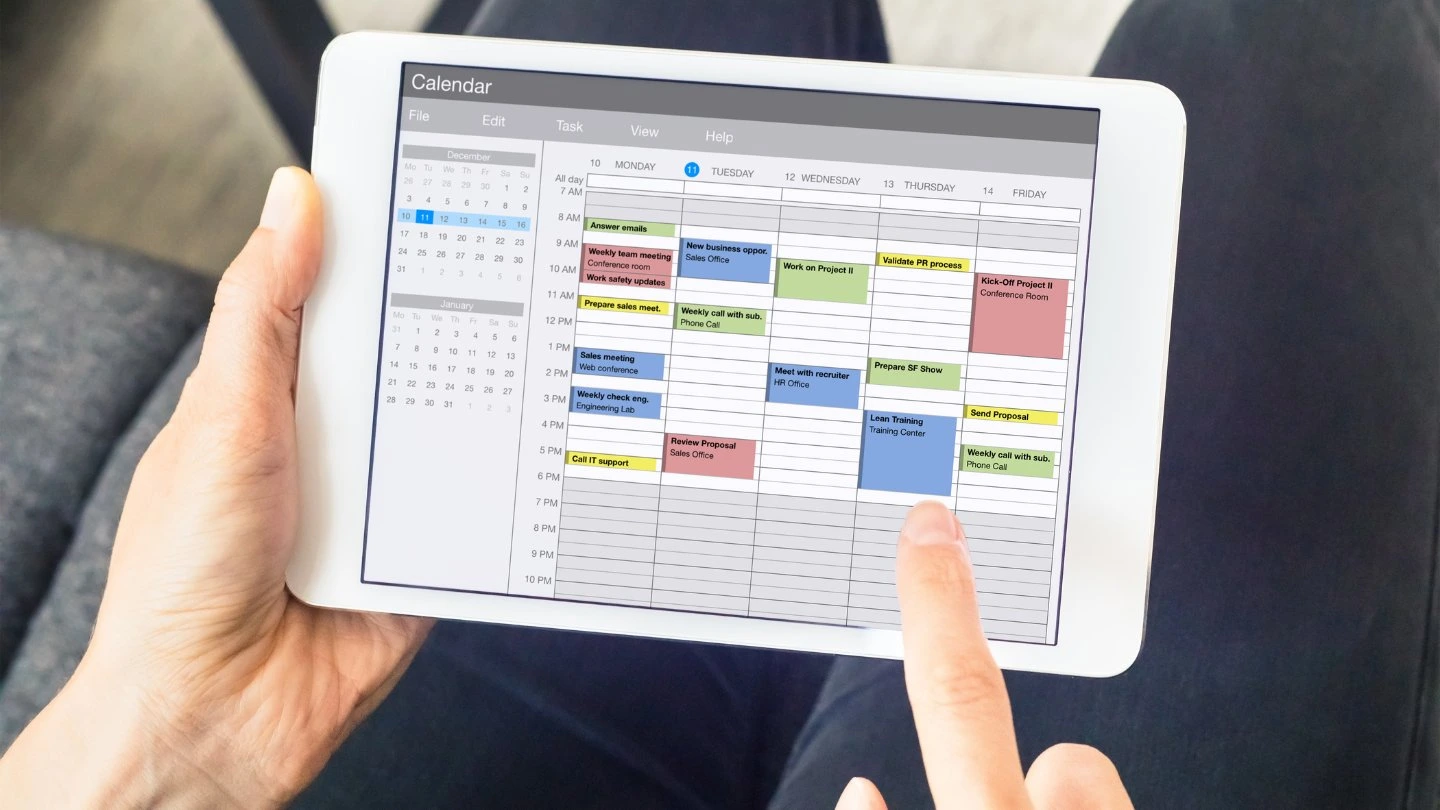
Sample Answer:
Being promoted to senior software developer during my previous job, I was responsible for leading an important client's project. The client wanted a unique feature that usually requires a month of work. However, I was required to complete it in only three weeks (Situation).
As I was completing my very first venture post-promotion, I decided to finish this. Afterward, I realized the project would require quite a long time to finish the project and create something of top quality (Task).
As soon as I saw the issue, I called the client, asking for an extension and explaining why it might take longer. The client graciously agreed to. After my thorough study and constant follow-ups, I collaborated with the team to ensure that wireframes were designed for the app and website and then completed (Action).
The project was finished and delivered before the deadline that was extended. However, I was able to organize my time better and not over-promise on things I was not able to meet (Result).
2. Do you remember when you've felt stress at work? What were you able to do in reaction?
Interviewers will use this question to assess how you handle difficult workplace circumstances. This means that you need to be sure to highlight your strengths and employ actual examples to show your abilities.
Sample Answer:
In my previous job as a software engineer, there was a deadline for a task that needed to be completed within one month (Situation).
As part of the team, I created a complicated module that required lots of programming and debugging (Task).
I cut the project into smaller, manageable tasks to ease the pressure and created a calendar with weekly and daily objectives. I focused on the most crucial and time-sensitive projects first, then delegated a few of the less crucial tasks to junior developers on my team. This allowed me to decrease my workload. I also regularly communicated with my leader to keep him up to date on my progress and any possible problems that could occur (Action).
In managing my time efficiently, I could finish the course on time and hand it directly to my team's leader for review. My team's leader was impressed by my ability to perform under pressure. The module received positive comments from both my team's leader and the client (Result).
3. The burden of work can be overwhelming for employees and their employers. Did you ever feel overwhelmed at your work? What would you do?
Interviewers ask this question to gauge whether you can handle massive workloads and large volumes. Your prepared answer can be proof of your ability and maturity to go beyond your scheduled hours when needed. An employer is looking to see how well you deal with challenging situations.
Sample Answer:
The most recent version of our software, released this year, could have been better (Situation).
As an employee of the front-line service team for customer assistance, the initial two weeks following the release were among my most challenging periods. The phone line was always crowded with customers waiting for their calls. In the span of a period of two weeks, I hung up on one call only to start another. I didn't stop in between. (Task).
However, I realized it was a temporary circumstance, that engineers were striving to correct the bugs, and a significant update was coming soon. So, I helped clients and worked in conjunction with engineers on the update to the release. (Action).
The release that included bugs was released exactly two weeks ago. The customer support team was able to weather the difficult time, and everything went back to normal shortly afterward. (Result).
Conclusion: Final Tips on Using the STAR Method in your Interview.
Be sure that your answer is appropriate with the description of your position. Please take note of the skills and attributes essential to the job and how they apply to the job, and then pick stories that showcase these traits.
Select a few examples that are both powerful and flexible. Create a couple of stories you can modify and tweak to different scenarios in light of your experiences.
For a perfect answer that feels at ease and natural, you can practice it with a mirror or a mock interview before the interview.
Take advantage of the opportunity to demonstrate the impact your participation made on a positive impact. Include the EXACT result of your efforts. Use numbers and statistics to support your claims and include the lessons you gained from your experiences. Good luck!

